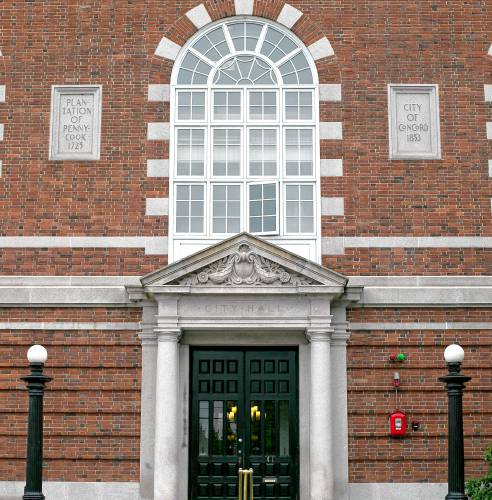Who’ll foot bill for water projects?

Concord City Hall
|
Published: 05-18-2024 1:00 PM
Modified: 05-19-2024 9:30 AM |
With the largest increases in proposed city spending next year tied to major water and sewer projects on the Heights, some city councilors appear open to leaning harder on developers to pay for growth-driven infrastructure improvements.
The more than $170 million proposed 2025 city budget includes a $40 million increase in spending, roughly $30 million of which is tied to capital projects. The vast majority of that spending, more than $24 million, will support a sewer main update and new pump station serving the Heights.
These improvements, City Manager Tom Aspell told city councilors at his opening budget presentation Thursday night, are “to support economic development, additional housing growth” in that area.
Those projects do not impact property taxes — which go up 3.89% under Aspell’s proposal — and are drawn from wastewater coffers: water and wastewater ratepayers will be charge roughly 8% more next year. That comes out to a few dollars more per month for the “average homeowner,” who should expect continued and larger rate increases in the coming years, according to Aspell.
“You’re upgrading them because you’re anticipating the increased demand for capacity,” Aspell said.
The city currently pays to improve sewer capacity and service as housing grows, but if a certain project needed a sewer line put in, it would pay for that, Aspell explained.
With major new housing projects in the works, some councilors asked about whether the city should charge developers more for the concentrated impact they have on city resources.
“I’m trying to understand the distinction between running a line to somewhere where there has not been a line and the developer paying that cost versus a decision to update a line that is existing — hypothetically — only needing to update it because of anticipated development,” At-Large Councilor Judith Kurtz said. “I understand why we would update lines, but who foots the bill for it?”
Article continues after...
Yesterday's Most Read Articles
 Sudden pile of trash near Exit 13 on Manchester Street in Concord considered ‘illegal dumping’
Sudden pile of trash near Exit 13 on Manchester Street in Concord considered ‘illegal dumping’
 Motorcyclist being evaluated at Concord Hospital after crash with mail truck
Motorcyclist being evaluated at Concord Hospital after crash with mail truck
 Hometown Hero: Sarah Guinther is ‘changing the world, one cookie at a time’ through the Maddi Hatter Cookie Company
Hometown Hero: Sarah Guinther is ‘changing the world, one cookie at a time’ through the Maddi Hatter Cookie Company
 Merrimack Valley schools to consider eliminating most Penacook bus routes
Merrimack Valley schools to consider eliminating most Penacook bus routes
 Memorial Field Committee inches toward final conceptual plan and will receive more accurate cost estimates on Aug. 12th
Memorial Field Committee inches toward final conceptual plan and will receive more accurate cost estimates on Aug. 12th
 OSHA investigates Pittsfield partial building collapse
OSHA investigates Pittsfield partial building collapse
Ward 10 Councilor Jeff Foote, the director of public works in Bedford, noted that compared to other municipalities, Concord charges fewer assessment- and other impact-related fees to major developments.
“Other communities do assign assessments to projects,” Foote said. “For example, a 1,000-unit apartment, single-bedroom in other communities would generate — in some communities would generate — more than $1.1 million, which would offset this increase we’re talking about today.
“I think those are things that we need to look at for the enterprise fund and also for our general budgeting practices.”
The city currently charges new projects a “connection fee” for linking to city sewers, which is tied to their size, but does not require projects specifically to contribute in long-term investments in the system, according to Deputy City Manager of Development Matt Walsh.
When the Steeplegate Mall was built just before 1990, Walsh explained, Concord did have sewer investment fee districts. They were discontinued by a previous council, after the mall’s fees were paid, he said.
Current plans by developer Onyx Partners are to tear down much of the existing mall buildings and construct several mixed-use apartment buildings and large retailers. The project would add roughly 600 apartments to Loudon Road.
In an interview, Mayor Byron Champlin said he welcomed conversations about ways to increase cash-flow from places other than property taxes, but that the city, still angling to attract economic and housing opportunities, should proceed cautiously.
“In the past, the council pared back impact fees as a way to stimulate growth,” Champlin said. “It’s an appropriate discussion to have, but it needs to balance the advantages and disadvantages.”







 Mullet madness: Young man who died in motorcycle accident remembered at local fundraiser
Mullet madness: Young man who died in motorcycle accident remembered at local fundraiser ‘Entire paradigm has to shift’: Majority of parents express support for phone ban, but predict rocky rollout
‘Entire paradigm has to shift’: Majority of parents express support for phone ban, but predict rocky rollout New Hampshire committee seeks to prevent domestic fatalities like murder-suicide in Berlin
New Hampshire committee seeks to prevent domestic fatalities like murder-suicide in Berlin ‘A little piece of everything I like’: New Pittsfield barbershop brings more than a haircut to downtown
‘A little piece of everything I like’: New Pittsfield barbershop brings more than a haircut to downtown
